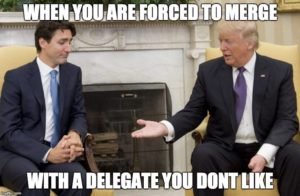
If you want to be the delegate that everyone just loves in committee, opt for a more collaborative approach in committee. Before committee starts, talk to everyone in the committee, but not just about MUN. If it happens to be their first conference, ease them down and remind them that they’re going to do a great job. Be someone that they can trust, even if it means sending an extra note with a smiley face after they made a good speech.
A collaborative delegate combines solutions from different members. You can often spot them urging delegates to “open up the circle” and hear from members who have not spoken yet. This creates a sense of trust between the majority of delegates who aren’t too experienced with Model UN, causing you to be well-liked by both the committee and the chair. They would opt for all members of the coalition to sit down and hear the final draft of the working paper before handing it in, instead of just hastily running up to the chair to hand it in. Collaborative delegates are usually able to spot delegates that have great substance, but not enough confidence to voice their opinions; thus, it becomes your responsibility to help that delegate spread his ideas and gain a bit of confidence.
All in all, a collaborative delegate is usually the most trustworthy in the room. The downside to being the collaborative delegate is that others may not view you as competition. While you’re helping out other delegates, other bloc members that are more aggressive might think you’re wasting time and try and cut you out of the working paper. Leading members of other blocs might not regard you as a threat, underestimating you or your contribution to the paper. On the other hand, a collaborative delegate should have made the most friends in the bloc, which can be a useful tool to prevent that. While this style is extremely effective for delegates, it does have some major drawbacks that will take practice to overcome.

If you decide to take a competitive approach, keep in mind that these delegates usually have complete totalitarian control over a coalition. While this might sound appealing, members that aren’t competitive will begin to dislike you for not voicing their ideas. This often results in kicking someone out of a coalition, making powerful disruptive speeches, or engaging in heated debate. Actions like these usually upset other delegates, but competitive delegates often have a swarm of delegates at their disposal because, at the end of the day, people want to be led. And that will occur whether you’re a competitive or collaborative delegate.
So at the end of the day, it’s up to you. Whether you want to be someone who listens to other people’s ideas or if you want to be someone lives for hard-core debate, the only way to find out is to PRACTICE! Try a slightly different approach the next time you’re in committee and talk to alumni about their experiences. Personally, I always hated the side of MUN that would kick someone out of a coalition so I opt for a collaborative approach. Other delegates are extremely successful with a competitive approach and find that they are pleased with their performance in committee. Both approaches have their drawbacks and benefits, so no singular idea is better than the other. Just make sure you’re having fun while you’re in committee!


